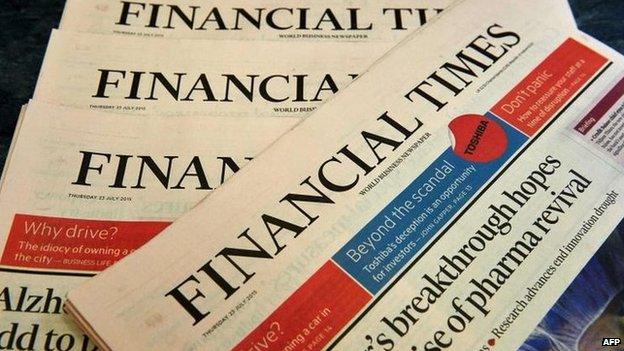Financial Times sold to Nikkei by Pearson for £844m
- Published

Publishing group Pearson has announced it is to sell the Financial Times Group to Japanese media firm Nikkei for £844m in cash.
Speculation that Pearson was eying a sale of the 127-year old newspaper emerged on Monday.
The sale does not include Pearson's 50% stake in the Economist or the FT's London office at One Southwark Bridge, the company said in its statement., external
Shares in the group closed up more than 2% on the news.
"Pearson has been a proud proprietor of the FT for nearly 60 years. But we've reached an inflection point in media, driven by the explosive growth of mobile and social", said Pearson's chief executive John Fallon.
"In this new environment, the best way to ensure the FT's journalistic and commercial success is for it to be part of a global, digital news company," he continued.
The Financial Times Group consists of the "Pink 'un" and a stable of other business publications, among them Investors Chronicle, the Banker, MandateWire, Money-Media and Medley Global Advisors.
Pearson, which also owns a large stake in the book publisher Penguin Random House, has long been thought ready to sell the newspaper.
The publishing group has been moving increasingly into the provision of education services in North America and in emerging markets. It has previously said it remained committed to the newspaper because of its strong brand.
Digital subscriptions
The announcement of the sale comes a day before the release of Pearson's half-year results.
Last year, the group, which gets 90% of its revenues from its educational book publishing business, reported a 12.5% fall in net profit to £471m as a result of restructuring costs and currency fluctuations.
The Financial Times, which launched in 1888, has a combined paid print and digital circulation of 720,000, but 70% of its readership is generated through its website.
The newspaper's digital subscriptions overtook print circulation in 2012, while tablets and smartphones account for about half of traffic to the website.
Nikkei is Asia's largest independent business media group. It owns the flagship newspaper Nikkei and other operations, ranging from books and magazines to digital media, database services and broadcasting.
The company's chairman and chief executive Tsuneo Kita said: "I am extremely proud of teaming up with the Financial Times, one of the most prestigious news organisations in the world.
"Our motto of providing high-quality reporting on economic and other news, while maintaining fairness and impartiality, is very close to that of the FT.
'Knock-out punch'
"We share the same journalistic values. Together, we will strive to contribute to the development of the global economy."
Former Financial Times editor Richard Lambert told the BBC World Service he was surprised the group was bought by Nikkei.
"Nikkei only came into the frame, as I understand it, fairly recently. Those that were interested in it were expecting Axel Springer to be the buyer, but clearly Nikkei came with a knock-out punch," he said.
He said he was "rather sad" to see Pearson sell the FT Group but added "the world moves on".
Mr Lambert said editorial independence was key to the newspaper's success and its value, adding: "the market price that has been paid captures these values. It's very important, I'm sure Nikkei would understand, that they have to reinforce those values as they take the project forward".
Asked why Pearson was selling the FT, he said: "They've lost interest. They are now a book publishing company, education publishing company, there isn't anybody there who is particularly interested in newspapers and I guess they want to deploy the assets somewhere else."
But he added it would be "interesting to see what happens" to Pearson's 50% stake in the Economist.
- Published23 July 2015
- Published15 September 2014
